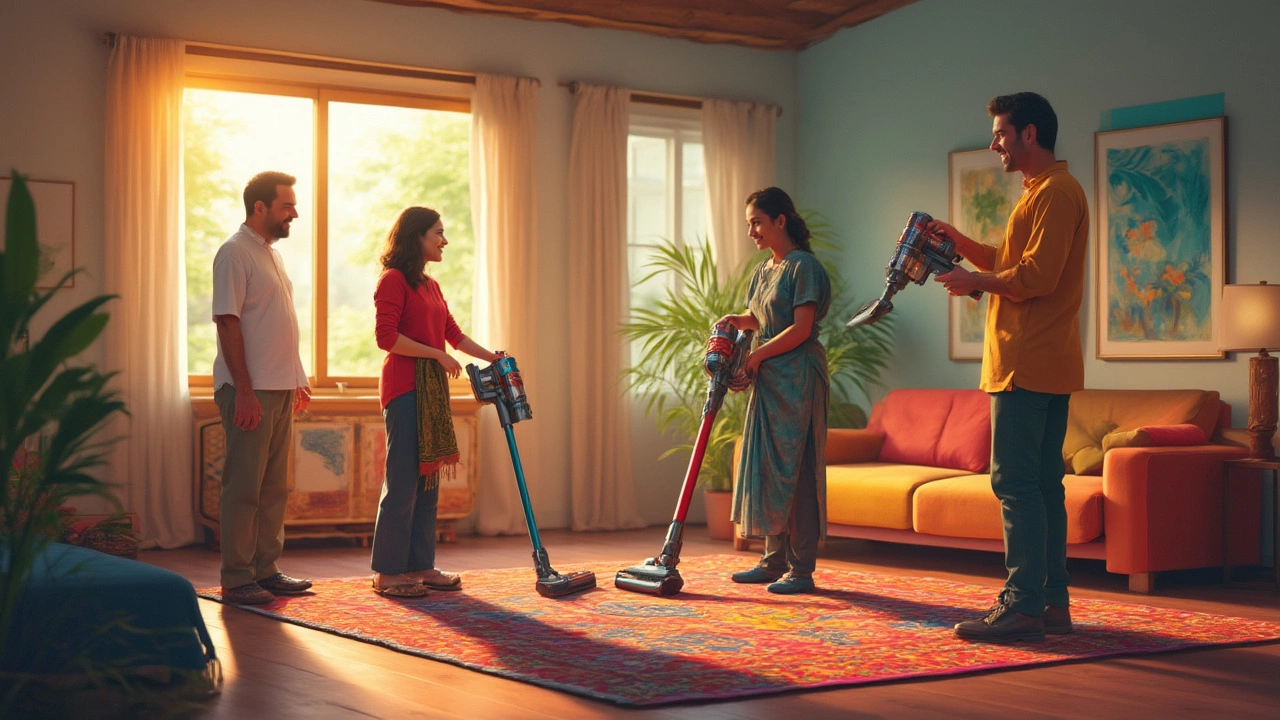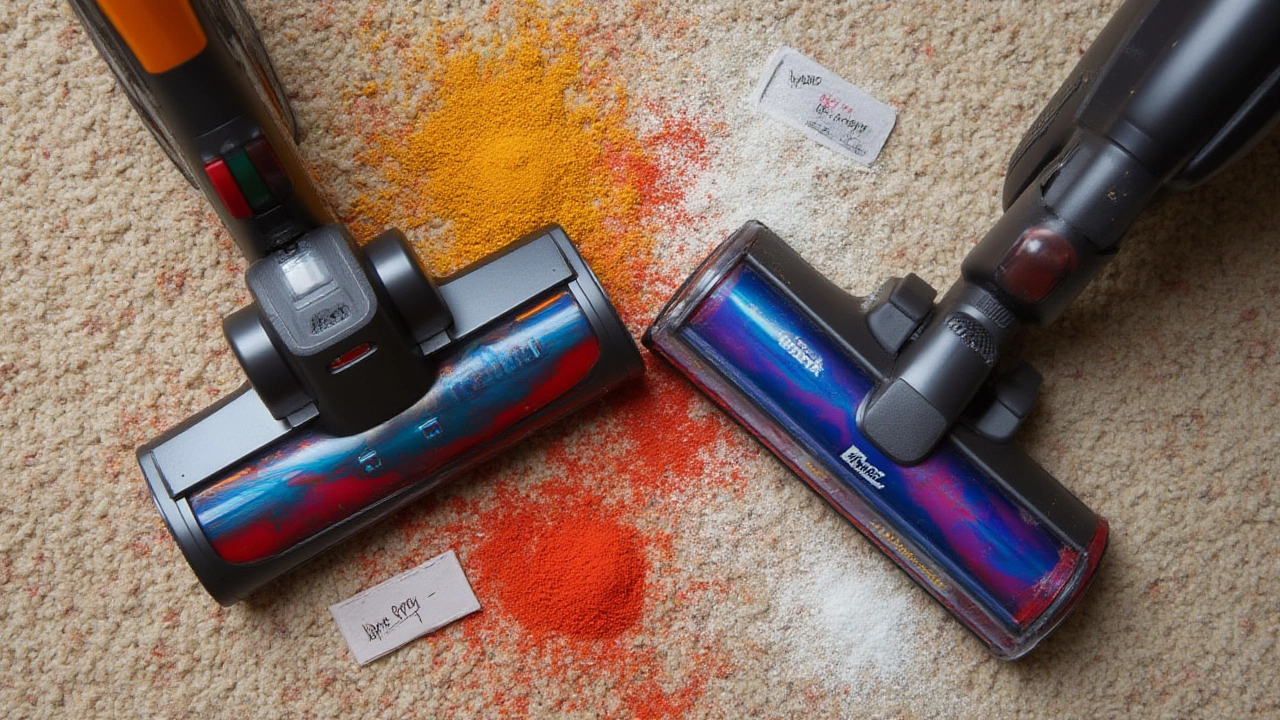
You probably know someone who swears by their vacuum—either singing Dyson’s praises or claiming Shark is the real deal. Some say Dyson is the king of suction and engineering. Others think Shark’s flexibility and price can’t be beat. So, who’s right? Before splashing out a few hundred pounds or scrolling all night on Argos or Amazon, you’ll want to know if you’ll end up with just a dustbin on wheels—or a gadget that actually keeps your carpets looking new. This topic isn’t just about power or flashy adverts; homes have unique needs, pets that shed, wooden stairs that need careful attention, or small flats where storage matters just as much as suction. Still not sure where you fit in? You’re hardly alone. This Shark vs Dyson debate is as fierce as city versus seaside. Let’s put these two to the test.
What Makes Shark and Dyson a Big Deal?
If you ever browse a high-street store—or even binge home upgrade shows—you’ll notice Shark and Dyson front and centre. Both brands spend a fortune on clever adverts, and they’re not shy about promising spotless homes. Dyson built its name on bagless cyclonic tech and is famous for powerful, innovative designs. The founder, James Dyson, started out annoyed at clogged vacuum bags in the 80s. After thousands of prototypes, he brought that first cyclonic vacuum to market; suddenly, cleaning nerds everywhere were arguing about airflow.
Shark is a US-based brand known for clever engineering that solves everyday problems. They’re actually part of SharkNinja, the company behind those kitchen ninjas you see chopping everything on YouTube. Shark’s edges? Their vacs tend to cost less, offer flexible designs, and focus on little features like Lift-Away canisters and self-cleaning brush rolls. Where Dyson leans high-tech (they even have vacuums with LCD screens showing dust particle size!), Shark wins hearts for practical details.
Both brands regularly hit bestseller lists and rake in thousands of glowing reviews—on sites like John Lewis, Currys, and Amazon. As of July 2025, Dyson’s UK cordless vacuum sales have spiked by 14% over last year, according to a survey by Retail Week. Meanwhile, it’s rare to meet pet owners now without a Shark in their utility cupboard. Both score well in Which? magazine’s annual tests though for different reasons: Dyson for sheer suction, Shark for value and versatility. If that sounds vague, hang tight—we’ll get more specific.
Design, Features, and Everyday Use: Lifting the Lid
Let’s start with design. Dyson vacuums are instantly recognizable—sleek, futuristic, often in bright colours. Their cordless stick models, like the V15 Detect, stand upright and dock neatly on a wall. They’re lightweight (V12 Detect Slim is just 2.2kg), ideal for carrying up stairs or awkward corners. Dyson loves one-button bin emptying, and their latest models even use lasers to spot dust you can’t see. Seriously, green lights that make crumbs and pet hair look like sci-fi hazards.
Shark focuses on what real homes need—a bit less polish, but functional details everywhere. Many of their uprights and cordless models include the Lift-Away system: you can detach the main canister to hoover stairs, car interiors, or high shelves, all without lugging the full cleaner. Some newer Sharks have DuoClean rollers to tackle both hard floors and carpets in one sweep. The Anti Hair Wrap tech means you rarely need scissors to cut tangled fur (every pet parent’s dream). Their headlights are a practical bonus—if you’ve ever wondered where the dust bunnies hide, Shark’s got you.
Now, about filters. Dyson sticks by HEPA standard in their higher-end models, capturing 99.97% of microscopic allergens—so allergy sufferers and pet owners love them. Shark offers Anti-Allergen Complete Seal—close results, though the filter may be a tad trickier to replace. Both brands offer cordless sticks, corded uprights, and handhelds—but choose wisely, because battery life and dustbin size matter a lot. For example, the Dyson V15 Detect Animal promises up to 60 minutes on Eco mode, but expect less if you amp up the power or use motorized heads. Shark’s Stratos Cordless Max gets about 60 minutes as well, but drops faster if your home is wall-to-wall carpet.
Noise? Dyson’s engineering reduces the shriek you remember from older vacuums, but at max suction, all bets are off. Shark’s tend to run slightly quieter, though it’s still tough to sneak a late-night clean in a flatshare. Here’s a handy comparison of standout features:
| Brand / Model | Weight | Battery life (Cordless) | Dustbin Capacity | HEPA/Allergen Filter |
|---|---|---|---|---|
| Dyson V15 Detect | 3 kg | 60 min | 0.76 L | Yes (HEPA) |
| Dyson V12 Detect Slim | 2.2 kg | 60 min | 0.35 L | Yes (HEPA) |
| Shark Stratos Cordless Max | 4.1 kg | 60 min | 0.7 L | Yes (Anti-Allergen Complete Seal) |
| Shark Lift-Away Upright | 6.5 kg | — (Corded) | 1.3 L | Yes |
One thing to remember: batteries wear out. Even top Dyson and Shark models may need new batteries every couple of years if you use them daily at full power. Swapping is easy on newer models but check if replacements cost more than you expected. Also, Dyson dock stations tend to look flashier, but Shark’s free-standing cradles mean you don’t need to drill anything—handy if you’re renting here in Brighton or anywhere housing contracts frown on wall damage.

Suction, Cleaning Power, and the Real Dirt Test
This is what it’s all about. You can have lights, digital screens, and self-cleaning filters, but does the vacuum actually suck up the mess—whether it’s crushed biscuits, dog fur, or last night’s popcorn? Dyson is obsessed with cyclonic force (they’re famous for it), and their stats are impressive: The V15 Detect’s Hyperdymium motor spins up to 125,000 rpm, claiming up to 230AW (air watts) of suction. For context, that’s top-of-the-line in cordless vacs as of 2025.
Shark doesn’t publish air watts as loudly, but independent testers like Which? and Trusted Reviews found the Stratos Cordless Max picks up 95% of flour and oats from carpets in one pass, similar to Dyson’s V11 or V15 series. Sharks on hard floors shine, thanks to their dual brushroll systems that sweep up debris and fine dust at once. If you live in a place with both laminate and thick rugs, this feature is a godsend.
Real talk: edge cleaning is where surprises pop up. Dyson’s brush heads are wider and sometimes leave a tiny margin near skirting boards. Shark’s powered lift-away wands, with their more compact heads, nibble closer to walls and under furniture. And if you’re ever cleaning a car, Shark’s flexible attachments (like their Pet Power Brush) dig out stubborn sand and fur better. For ongoing maintenance, Dyson’s washable filters help keep costs down, while Shark’s self-cleaning brushrolls reduce downtime from untangling hair.
Here’s where it gets interesting for allergy sufferers. Dyson’s advanced HEPA systems, especially in the V15 and V12, trap particles as small as 0.1 microns. Shark comes close—their latest models claim to trap 99.9% of dust/allergens. Asthma UK supports both brands for homes with pets or sensitivity. If you’ve got cats, dogs, or a never-ending cycle of hayfever, you probably want a vacuum that excels here.
Love or hate their price tags, Dysons remain slightly ahead on raw suction. Yet many reviewers—myself included—find that Shark’s practical tools and ease of use sometimes beat sheer power. Take stairs and cars, for example: Shark’s portable canisters just work better, especially if you live in a home with tight turns or odd angles.
Cost, Warranties, and Making a Smart Choice
If you’re anything like me, the price tag isn’t just a number—it’s a gut check. Dyson is widely seen as a splurge. The latest V15 Detect Animal Plus? Expect to pay about £599, sometimes up to £699 for bundles with extra heads. Refurbs or last year’s models save a bit, but you’re rarely getting a proper Dyson cordless under £350 unless it’s Black Friday. That being said, their vacuums last ages if you treat them well, and their standard two-year warranty includes parts and labour—no faff, just ring them up and they sort repairs.
Shark, on the other hand, is a lot kinder on your wallet. Their top-end cordless Stratos models hover around £399, but you’ll find solid corded and stick vacs as low as £169 in big shops. What’s more, Shark offers a five-year warranty on many of their vacuums. That covers accidental damage and even normal wear—provided you register online after purchasing. In Brighton, I’ve had mates drop their Shark down tiled stairs and get a replacement canister, no questions asked. Customer service for both brands is fast and rated higher than rivals like Hoover or Miele, who sometimes make you wrestle with receipts or weeks of waiting.
Replacement parts and batteries can catch you by surprise. Dyson’s original spares tend to cost more than Shark’s, with a battery or filter easily running £60-£100. Shark parts are more available on the high street and usually cheaper, though sometimes third-party pieces (like no-name filters) don’t fit as well as the originals. Tip: Always double-check your model number before buying a part, regardless of the brand, since older versions are phased out without warning.
Now, for some quirky tips. If you want a vacuum that literally tells you if your floor is clean, only Dyson’s V15 offers that particle count screen—it even colour codes the type of dust it senses. Shark doesn’t have the sensors or screens, but those headlights can be surprisingly useful on dull winter mornings. If you struggle with wrist pain or have arthritis, Dyson’s trigger-style power button gets mixed feedback—some love the precision, some find holding it down awkward for longer cleans. Shark sticks with traditional on/off switches, which might suit some folks better.
Everything said, your best bet comes down to your priorities: if you want maximum suction, a futuristic vibe, and don’t mind paying a premium, the Dyson vacuum is hard to beat. But if you’re after value, reliability, and clever features designed for real-life mess and pets, Shark is the brand more likely to keep you smiling after cleaning up the latest disaster in your lounge.